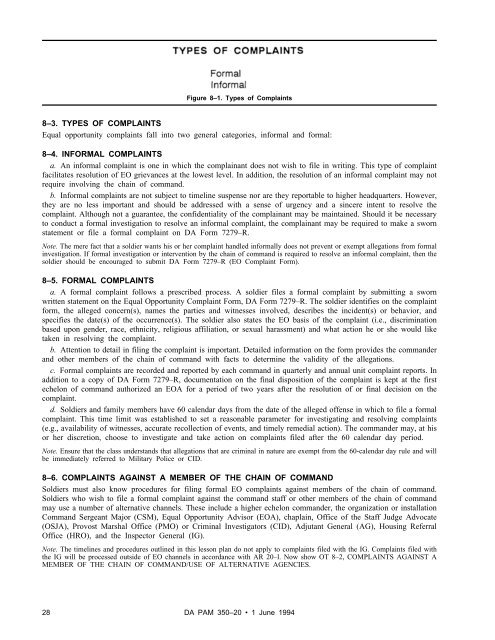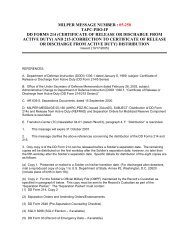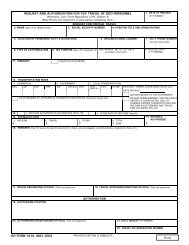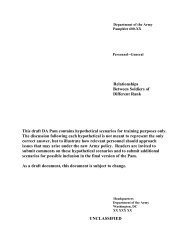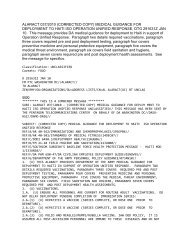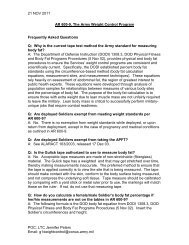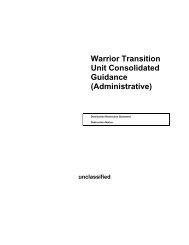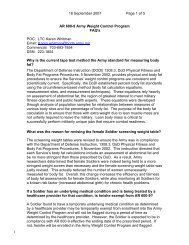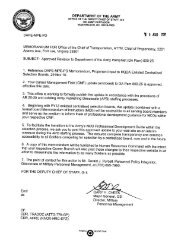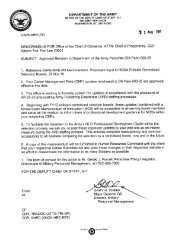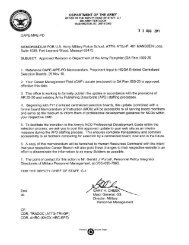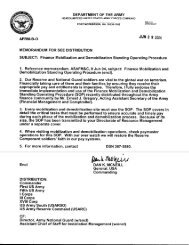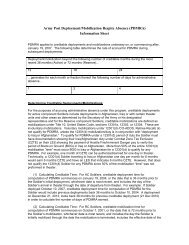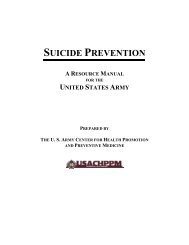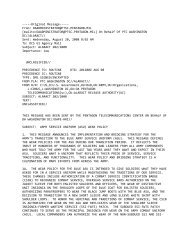Unit Equal Opportunity Training Guide - Deputy Chief of Staff ARMY ...
Unit Equal Opportunity Training Guide - Deputy Chief of Staff ARMY ...
Unit Equal Opportunity Training Guide - Deputy Chief of Staff ARMY ...
You also want an ePaper? Increase the reach of your titles
YUMPU automatically turns print PDFs into web optimized ePapers that Google loves.
Figure 8–1. Types <strong>of</strong> Complaints<br />
8–3. TYPES OF COMPLAINTS<br />
<strong>Equal</strong> opportunity complaints fall into two general categories, informal and formal:<br />
8–4. INFORMAL COMPLAINTS<br />
a. An informal complaint is one in which the complainant does not wish to file in writing. This type <strong>of</strong> complaint<br />
facilitates resolution <strong>of</strong> EO grievances at the lowest level. In addition, the resolution <strong>of</strong> an informal complaint may not<br />
require involving the chain <strong>of</strong> command.<br />
b. Informal complaints are not subject to timeline suspense nor are they reportable to higher headquarters. However,<br />
they are no less important and should be addressed with a sense <strong>of</strong> urgency and a sincere intent to resolve the<br />
complaint. Although not a guarantee, the confidentiality <strong>of</strong> the complainant may be maintained. Should it be necessary<br />
to conduct a formal investigation to resolve an informal complaint, the complainant may be required to make a sworn<br />
statement or file a formal complaint on DA Form 7279–R.<br />
Note. The mere fact that a soldier wants his or her complaint handled informally does not prevent or exempt allegations from formal<br />
investigation. If formal investigation or intervention by the chain <strong>of</strong> command is required to resolve an informal complaint, then the<br />
soldier should be encouraged to submit DA Form 7279–R (EO Complaint Form).<br />
8–5. FORMAL COMPLAINTS<br />
a. A formal complaint follows a prescribed process. A soldier files a formal complaint by submitting a sworn<br />
written statement on the <strong>Equal</strong> <strong>Opportunity</strong> Complaint Form, DA Form 7279–R. The soldier identifies on the complaint<br />
form, the alleged concern(s), names the parties and witnesses involved, describes the incident(s) or behavior, and<br />
specifies the date(s) <strong>of</strong> the occurrence(s). The soldier also states the EO basis <strong>of</strong> the complaint (i.e., discrimination<br />
based upon gender, race, ethnicity, religious affiliation, or sexual harassment) and what action he or she would like<br />
taken in resolving the complaint.<br />
b. Attention to detail in filing the complaint is important. Detailed information on the form provides the commander<br />
and other members <strong>of</strong> the chain <strong>of</strong> command with facts to determine the validity <strong>of</strong> the allegations.<br />
c. Formal complaints are recorded and reported by each command in quarterly and annual unit complaint reports. In<br />
addition to a copy <strong>of</strong> DA Form 7279–R, documentation on the final disposition <strong>of</strong> the complaint is kept at the first<br />
echelon <strong>of</strong> command authorized an EOA for a period <strong>of</strong> two years after the resolution <strong>of</strong> or final decision on the<br />
complaint.<br />
d. Soldiers and family members have 60 calendar days from the date <strong>of</strong> the alleged <strong>of</strong>fense in which to file a formal<br />
complaint. This time limit was established to set a reasonable parameter for investigating and resolving complaints<br />
(e.g., availability <strong>of</strong> witnesses, accurate recollection <strong>of</strong> events, and timely remedial action). The commander may, at his<br />
or her discretion, choose to investigate and take action on complaints filed after the 60 calendar day period.<br />
Note. Ensure that the class understands that allegations that are criminal in nature are exempt from the 60-calendar day rule and will<br />
be immediately referred to Military Police or CID.<br />
8–6. COMPLAINTS AGAINST A MEMBER OF THE CHAIN OF COMMAND<br />
Soldiers must also know procedures for filing formal EO complaints against members <strong>of</strong> the chain <strong>of</strong> command.<br />
Soldiers who wish to file a formal complaint against the command staff or other members <strong>of</strong> the chain <strong>of</strong> command<br />
may use a number <strong>of</strong> alternative channels. These include a higher echelon commander, the organization or installation<br />
Command Sergeant Major (CSM), <strong>Equal</strong> <strong>Opportunity</strong> Advisor (EOA), chaplain, Office <strong>of</strong> the <strong>Staff</strong> Judge Advocate<br />
(OSJA), Provost Marshal Office (PMO) or Criminal Investigators (CID), Adjutant General (AG), Housing Referral<br />
Office (HRO), and the Inspector General (IG).<br />
Note. The timelines and procedures outlined in this lesson plan do not apply to complaints filed with the IG. Complaints filed with<br />
the IG will be processed outside <strong>of</strong> EO channels in accordance with AR 20–l. Now show OT 8–2, COMPLAINTS AGAINST A<br />
MEMBER OF THE CHAIN OF COMMAND/USE OF ALTERNATIVE AGENCIES.<br />
28 DA PAM 350–20 1 June 1994


